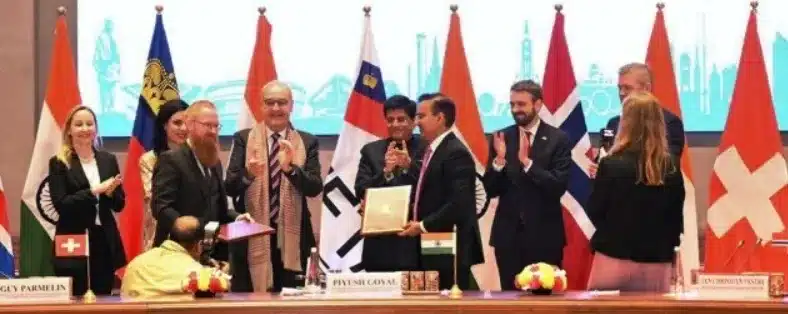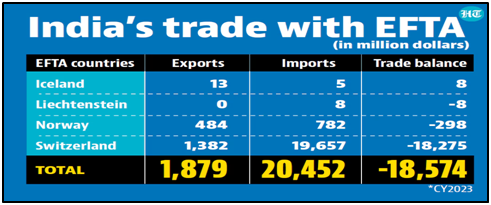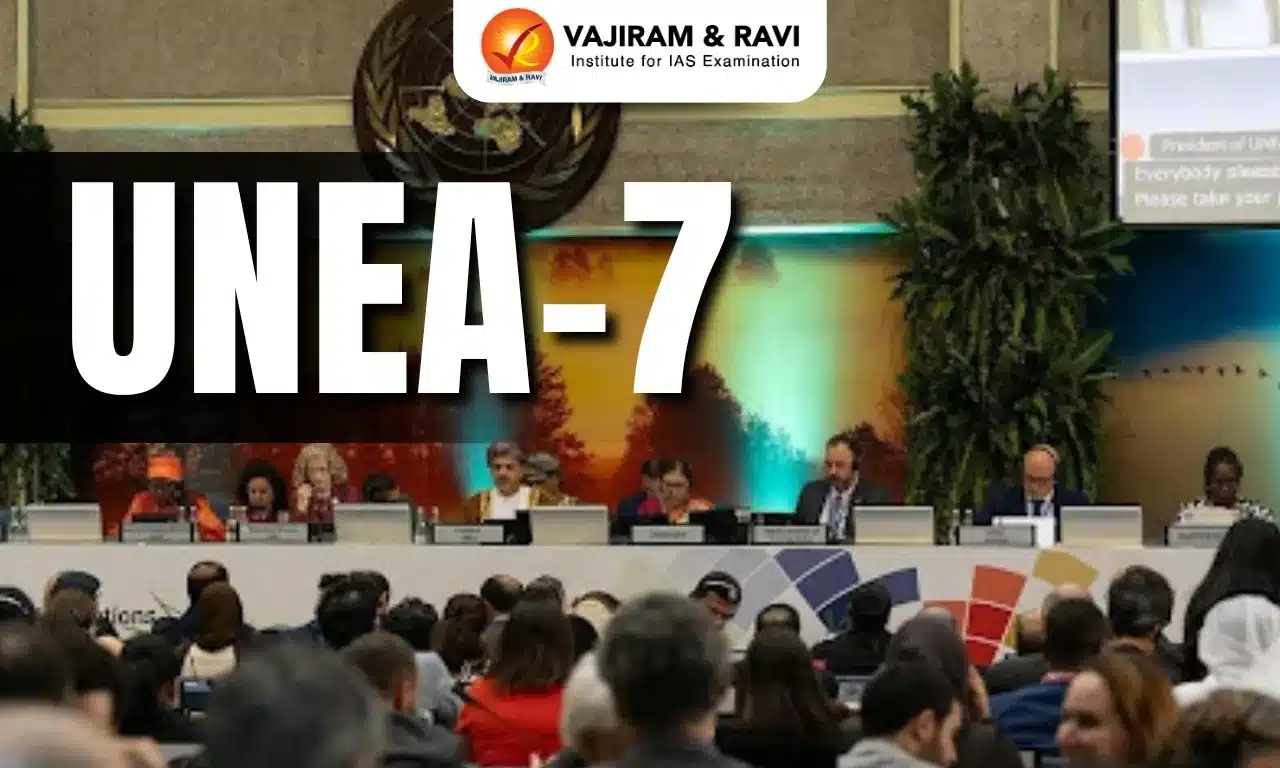What’s in today’s article?
- Why in news?
- What is European Free Trade Association (EFTA)?
- What is Trade and Economic Partnership Agreement (TEPA)?
- Key highlights of the TEPA
- Significance of TEPA for India
- Challenges for India
Why in news?
- India-European Free Trade Association (EFTA) signed a Trade and Economic Partnership Agreement (TEPA).
- India has been working on a TEPA with EFTA countries comprising Switzerland, Iceland, Norway & Liechtenstein.
- This agreement aims to encourage investments and enhance trade in goods and services between the two parties.
European Free Trade Association (EFTA)
- About
- The EFTA is the intergovernmental organisation of Iceland, Liechtenstein, Norway and Switzerland.
- It was set up in 1960 (by the Stockholm Convention in 1960) by its then seven Member States for the promotion of free trade and economic integration between its members.
- The organisation operates in parallel with the European Union (EU), and all four member states participate in the European Single Market and are part of the Schengen Area.
- However, they are not a party to the European Union Customs Union.
- The main tasks of EFTA-
- Maintaining and developing the EFTA Convention, which regulates economic relations between the four EFTA States;
- Managing the Agreement on the European Economic Area (EEA Agreement), which brings together the EU and 3 of the EFTA States – Iceland, Liechtenstein and Norway – in a single (internal) market.
- Developing EFTA’s worldwide network of free trade agreements.
- Trade relation between India and EFTA countries
Trade and Economic Partnership Agreement (TEPA)
- About
- India signed a trade agreement with the four-nation EFTA. This agreement is officially dubbed Trade and Economic Partnership Agreement (TEPA).
- The agreement comprises of 14 chapters with main focus on market access related to goods, rules of origin, trade facilitation, trade remedies, etc.
- This is India’s fourth such agreement since 2014. The previous agreements were signed with Mauritius, the UAE, and Australia.
- Aim: For the first time in history of FTAs, binding commitment of $100 bn investment and 1 million direct jobs in the next 15 years has been given.
Key highlights of the TEPA
- Legal commitment for promoting target-oriented investment and creation of jobs
- EFTA has committed to promote investments with the aim to:
- increase the stock of FDI by USD 100 billion in India in the next 15 years, and
- to facilitate the generation of 1 million direct employment in India, through such investments.
- The investments do not cover foreign portfolio investment (FPI).
- EFTA has committed to promote investments with the aim to:
- Coverage
- EFTA is offering 92.2% of its tariff lines which covers 99.6% of India’s exports.
- The EFTA’s market access offer covers 100% of non-agri products and tariff concession on Processed Agricultural Products (PAP).
- India is offering 82.7% of its tariff lines which covers 95.3% of EFTA exports of which more than 80% import is Gold.
- The effective duty on Gold remains untouched.
- Sensitivity related to PLI in sectors such as pharma, medical devices & processed food etc. have been taken while extending offers.
- Sectors such as dairy, soya, coal and sensitive agricultural products are kept in exclusion list.
- Sub-sectors included
- India has offered 105 sub-sectors to the EFTA and secured commitments in 128 sub-sectors from Switzerland, 114 from Norway, 107 from Liechtenstein, and 110 from Iceland.
- Inclusion of Services
- Services offers from EFTA include better access through digital delivery of Services (Mode 1), commercial presence (Mode 3) and improved commitments and certainty for entry and temporary stay of key personnel (Mode 4).
- TEPA has provisions for Mutual Recognition Agreements in Professional Services like nursing, chartered accountants, architects etc.
- Robust IPR regime
- The IPR chapter with Switzerland, which has high standard for IPR, shows India’s robust IPR regime.
- India’s interests in generic medicines and concerns related to evergreening of patents have been fully addressed.
Significance of TEPA for India
- Trade opportunities
- It will empower Indian exporters access to specialized inputs and create conducive trade and investment environment.
- This would boost exports of Indian made goods as well as provide opportunities for services sector to access more markets.
- Opportunity to integrate into EU markets
- Over 40% of Switzerland’s global services exports are to the EU.
- Indian companies can look to Switzerland as a base for extending its market reach to EU.
- Diversified supply chain: It will help India diversify imports away from China.
- Boost to Make in India and Atmanirbhar Bharat
- By encouraging domestic manufacturing in various sectors.
- These include: Infrastructure and Connectivity, Manufacturing, Machinery, Pharmaceuticals, Chemicals, Food Processing, Transport and Logistics, Banking and Financial Services and Insurance.
- Creation of large number of direct jobs
- Including better facilities for vocational and technical training.
Challenges for India
- India runs a trade deficit with most of its top trade partners except for the US.
- This is also true in the case of FTAs that India has signed in the past, especially with ASEAN nations.
- This is due to high average tariffs in India which hovers around 18%, among the highest in the world.
- The India-EFTA deal is also expected to widen the trade gap.
- That is why India pushed for investment commitment in the EFTA deal.
- Such investment could help India generate economic activity and jobs in exchange for giving market access to EFTA.
- Also, India could see gains in the services sector and the deal could help India power its services sector further.
- This is also true in the case of FTAs that India has signed in the past, especially with ASEAN nations.
- Difficulty for India to access the EFTA market
- Switzerland, which is India’s biggest trade partner among EFTA countries, decided to eliminate import duties on all industrial goods for all countries starting from January 1, 2024.
- The abolition of tariffs on all industrial products, including chemicals, consumer goods, vehicles and clothing is a concern for India.
- Industrial goods accounts for 98% of India’s $1.3 billion merchandise exports to Switzerland in FY2023.
- India’s goods will face stiffer competition despite any tariff elimination that would be part of the deal.
- Also, exporting agricultural produce to Switzerland remains challenging due to the complex web of tariffs, quality standards, and approval requirements.
- EFTA has not shown any inclination to make agriculture tariffs zero on most basic agricultural produce.
Q1) What are Processed agricultural products (PAPs)?
Processed agricultural products find themselves in a unique position between industrial goods (free trade) and agricultural products (agricultural protection). They include chocolate, biscuits, baked goods, sweets, soups, sauces, pasta, ice cream, instant coffee and food preparations.
Q2) What is European Economic Area ( EEA)?
The EEA includes EU countries and also Iceland, Liechtenstein and Norway. It allows them to be part of the EU ‘s single market. Switzerland is not an EU or EEA member but is part of the single market.
Source: India-EFTA Trade and Economic Partnership Agreement | Indian Express | Deccan Herald
Last updated on December, 2025
→ Check out the latest UPSC Syllabus 2026 here.
→ Join Vajiram & Ravi’s Interview Guidance Programme for expert help to crack your final UPSC stage.
→ UPSC Mains Result 2025 is now out.
→ UPSC Notification 2026 is scheduled to be released on January 14, 2026.
→ UPSC Calendar 2026 is released on 15th May, 2025.
→ The UPSC Vacancy 2025 were released 1129, out of which 979 were for UPSC CSE and remaining 150 are for UPSC IFoS.
→ UPSC Prelims 2026 will be conducted on 24th May, 2026 & UPSC Mains 2026 will be conducted on 21st August 2026.
→ The UPSC Selection Process is of 3 stages-Prelims, Mains and Interview.
→ UPSC Result 2024 is released with latest UPSC Marksheet 2024. Check Now!
→ UPSC Prelims Result 2025 is out now for the CSE held on 25 May 2025.
→ UPSC Toppers List 2024 is released now. Shakti Dubey is UPSC AIR 1 2024 Topper.
→ UPSC Prelims Question Paper 2025 and Unofficial Prelims Answer Key 2025 are available now.
→ UPSC Mains Question Paper 2025 is out for Essay, GS 1, 2, 3 & GS 4.
→ UPSC Mains Indian Language Question Paper 2025 is now out.
→ UPSC Mains Optional Question Paper 2025 is now out.
→ Also check Best IAS Coaching in Delhi


















